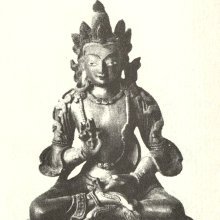Prajnakuta, Prajñākūṭa: 5 definitions
Introduction:
Prajnakuta means something in Buddhism, Pali, Hinduism, Sanskrit. If you want to know the exact meaning, history, etymology or English translation of this term then check out the descriptions on this page. Add your comment or reference to a book if you want to contribute to this summary article.
Images (photo gallery)
In Buddhism
Mahayana (major branch of Buddhism)
Source: Wisdom Library: Maha Prajnaparamita SastraPrajñākūṭa (प्रज्ञाकूट) is the name of a Bodhisattva according to Mahāprajñāpāramitāśāstra (chapter VII). Note: Although female and only eight years of age, Sāgaranāgarājaduhitā, the daughter of Sāgara, king of the Nāgas, had acquired anuttara-samyaksaṃbodhi, which constitutes the state of Buddha. As the Bodhisattva Prajñākūṭa and Śāriputra refused to believe that a woman could attain this high rank, she suppressed the signs indicating her sex in herself, showed herself endowed with male organs and transformed herself into a Bodhisattva who went to the south.

Mahayana (महायान, mahāyāna) is a major branch of Buddhism focusing on the path of a Bodhisattva (spiritual aspirants/ enlightened beings). Extant literature is vast and primarely composed in the Sanskrit language. There are many sūtras of which some of the earliest are the various Prajñāpāramitā sūtras.
Languages of India and abroad
Sanskrit dictionary
Source: Cologne Digital Sanskrit Dictionaries: Edgerton Buddhist Hybrid Sanskrit DictionaryPrajñākūṭa (प्रज्ञाकूट).—name of a Bodhisattva: Saddharmapuṇḍarīka 260.14 ff.
Source: Cologne Digital Sanskrit Dictionaries: Monier-Williams Sanskrit-English DictionaryPrajñākūṭa (प्रज्ञाकूट):—[=pra-jñā-kūṭa] m. Name of a Bodhi-sattva, [Saddharma-puṇḍarīka]
[Sanskrit to German]
Sanskrit, also spelled संस्कृतम् (saṃskṛtam), is an ancient language of India commonly seen as the grandmother of the Indo-European language family (even English!). Closely allied with Prakrit and Pali, Sanskrit is more exhaustive in both grammar and terms and has the most extensive collection of literature in the world, greatly surpassing its sister-languages Greek and Latin.
See also (Relevant definitions)
Partial matches: Prajna, Kuta.
Full-text: Sagaranagarajaduhita.
Relevant text
Search found 4 books and stories containing Prajnakuta, Prajñākūṭa, Prajna-kuta, Prajñā-kūṭa; (plurals include: Prajnakutas, Prajñākūṭas, kutas, kūṭas). You can also click to the full overview containing English textual excerpts. Below are direct links for the most relevant articles:
Maha Prajnaparamita Sastra (by Gelongma Karma Migme Chödrön)
Appendix 12 - Notes on the daughter of Sāgara (king of the nāgas) < [Chapter VIII - The Bodhisattvas]
Vimalakirti Nirdesa Sutra (by Robert A. F. Thurman)
A Dictionary Of Chinese Buddhist Terms (by William Edward Soothill)
